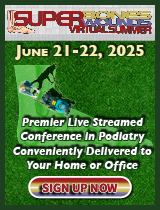05/28/2025 Steven D Epstein, DPM
We Missed the Boat
Nurse Practitioners (NPs) have that vaunted
“plenary” license, so if doing wound care, it's
all wounds (including ostomies), not just feet.
They're not independent? Some are, but most are
hospital employed, well compensated, so who cares,
and no financial risk that way – just salary and
benefits. So, if you don't do surgery but do wound
care you are competing with them. If you can't
plane the bone or excise the exostosis responsible
for the ulcer or apply the surgical graft what can
you do that they can't? Not to mention that since
they are hospital-employed, they are getting tons
more referrals than you – and tons more experience
and expertise that comes with that. And BTW, you
all know this because you view those free wound
care webinars at which they lecture provided by
companies like HMP, that began during the pandemic
and have continued. Oh, will they take over
routing foot care? I doubt they'll do much of it
themselves. Too time-consuming, not to mention
mainly not insurance reimbursable so they'll train
some nail techs or LPNs to do it.
Older docs like me remember when nursing truly was
a “lower” profession but that began changing about
the time I graduated from podiatry school (1980)
if not before. Then wages and privileges started
going up. My class had a number of “disappointed”
nurses and pharmacists and other “lesser” health
professionals. Bet that's changed, since. Being
self-employed, “your own boss” doesn't mean what
it used to.
Two and a half years ago, I had several brief
hospitalizations to take care of a number of
issues. It shocked me what the nurses could do vs
what they used to be allowed to do. Starting the
IVs, for example. And interpreting ECGs which are
flowing continuously across their monitor screens.
Yes, the resident or attending has to approve
everything but he/she knows that the nurses
already know what needs to be done in most cases.
And that's not even the APRNs.
We are now talking about adding even more years of
training to become a DO-DPM on top of the 4-4-3 to
become a licensed DPM who may or may not choose to
do surgery. Meanwhile, a CRNA has the typical 4
years of nursing school for the bachelor's degree
(which of course includes clinical training) and a
continuous 3 years of anesthesia training
(academic and clinical both) which culminates now
in the awarding of a doctorate degree but they
can't call themselves doctor, however, they make
more money that most of you, I bet.
Of course, between those years they have to prove
themselves with a few years of ER and/or ICU
experience, and acceptance into CRNA programs is
very competitive; however, that only guarantees
that they are in fact suitable and are making the
right career choice, unlike a DPM who while
academically smart enough may not otherwise be
suited to be a surgeon. And with that training, a
nurse anesthetist takes your life into their
hands, every patient, every time. Oh, but they're
not self-employed, usually, so they have to depend
on their facilities stocking all the supplies,
having all the equipment, and paying for all of
that, all the overhead, in other words. CRNPs do
make less that CRNAs, but their training is
shorter and less intense.
Regular good old-fashioned RNs make a very good
living and only need a bachelor's degree, and
their training likewise includes the clinical
portion. They can then decide what areas of
nursing they prefer, go on to advanced practice
training, or just remain as plain old RNs. (while
adding some certifications in various areas
without that much advanced training, like wound
care, for instance). Imagine if you could practice
podiatry with just a four year college degree! But
you wouldn't want to, you wouldn't make enough
money, so you'd become an RN or a PA.
We missed the boat and we keep missing it. I'm
glad I'm retired so I no longer have dog in this
fight.
Steven D Epstein, DPM (retired), Lebanon, PA







